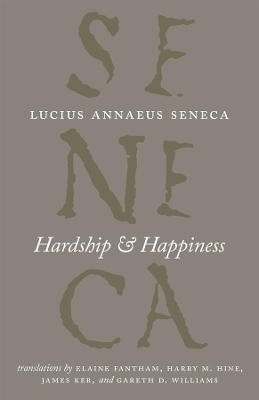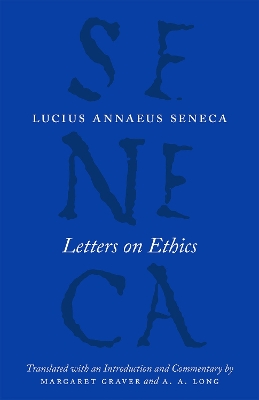Complete Works of Lucius Annaeus Seneca (CHUP)
5 total works
On Benefits
by Lucius Annaeus Seneca and Tutor in Ancient History and Fellow Miriam T Griffin
Published 17 June 2004
Lucius Annaeus Seneca (4 BCE - 65 CE) was a Roman Stoic philosopher, dramatist, statesman, and advisor to the emperor Nero, all during the Silver Age of Latin literature. "The Complete Works of Lucius Annaeus Seneca" is a fresh and compelling series of new English-language translations of his works in eight accessible volumes. Edited by world-renowned classicists Elizabeth Asmis, Shadi Bartsch, and Martha C. Nussbaum, this engaging collection restores Seneca - whose works have been highly praised by modern authors from Desiderius Erasmus to Ralph Waldo Emerson - to his rightful place among the classical writers most widely studied in the humanities. "On Benefits", written between 56 and 64 CE, is a treatise addressed to Seneca's close friend Aebutius Liberalis. The longest of Seneca's works dealing with a single subject - how to give and receive benefits and how to express gratitude appropriately - "On Benefits" is the only complete work on what we now call 'gift exchange' to survive from antiquity. Benefits were of great personal significance to Seneca, who remarked in one of his later letters that philosophy teaches, above all else, to owe and repay benefits well.
Lucius Annaeus Seneca (4 BCE-65 CE) was a Roman Stoic philosopher, dramatist, statesman, and advisor to the emperor Nero, all during the Silver Age of Latin literature. The Complete Works of Lucius Annaeus Seneca is a fresh and compelling series of new English-language translations of his works in eight accessible volumes. Edited by world-renowned classicists Elizabeth Asmis, Shadi Bartsch, and Martha C. Nussbaum, this engaging series helps restore Seneca-whose works have been highly praised by modern authors from Desiderius Erasmus to Ralph Waldo Emerson - to his rightful place among the classical writers most widely studied in the humanities. Hardship and Happiness collects a range of essays intended to instruct, from consolations - works that offer comfort to someone who has suffered a personal loss - to pieces on how to achieve happiness or tranquility in the face of a difficult world. Expertly translated, the essays will be read and used by undergraduate philosophy students and experienced scholars alike.
Lucius Annaeus Seneca (4 BCE to 65 CE) was a Roman Stoic philosopher, dramatist, statesman, and advisor to the emperor Nero, all during the Silver Age of Latin literature. Here, with the publication of "Anger, Mercy, Revenge" and "Natural Questions", the University of Chicago Press proudly inaugurates "The Complete Works of Lucius Annaeus Seneca", a fresh and compelling series of new English-language translations of his works in eight accessible volumes. Edited by world-renowned classicists Elizabeth Asmis, Shadi Bartsch, and Martha C. Nussbaum, this engaging collection restores Seneca - whose works have been highly praised by modern authors from Erasmus to Emerson - to his rightful place among those classical writers most widely studied in the humanities. "Anger, Mercy, Revenge" comprises three key writings: the moral essays 'On Anger' and 'On Clemency' - which were penned as advice for the then young emperor Nero - and the Apocolocyntosis, a brilliant satire lampooning the end of the reign of Claudius.
"Natural Questions" is a stand-alone treatise in which Seneca compiles and comments on the physical sciences of his day, offering us a valuable look at the ancient scientific mind at work. Both volumes introduce the Latinless reader to the writings of one of the ancient world's most fascinating - and acclaimed - philosophical figures, making them perfect for the undergraduate student and lay scholar alike.
"Natural Questions" is a stand-alone treatise in which Seneca compiles and comments on the physical sciences of his day, offering us a valuable look at the ancient scientific mind at work. Both volumes introduce the Latinless reader to the writings of one of the ancient world's most fascinating - and acclaimed - philosophical figures, making them perfect for the undergraduate student and lay scholar alike.
The Roman statesman and philosopher Seneca (4 BCE-65 CE) made innovative use of the letter format to record both his moral philosophy and his personal experiences. In Letters on Ethics, rich descriptions of city and country life in Nero's Italy mix with discussions of Roman poetry and oratory and with personal advice to Seneca's friend Lucilius. The first complete English translation of this work in nearly a century, Letters on Ethics presents Seneca's fascinating reflections on daily life, education, and philosophical thought at Rome and elucidates these topics for modern readers. Written as much for a general audience as for Lucilius, these engaging letters offer advice on how to deal with everything from nosy neighbors to sickness, pain, and death. Above all, Seneca uses the relaxed form of the letter to introduce many major issues in Stoicism, for centuries the most influential philosophical system in the Mediterranean world. His lively and at times humorous explanations have made the Letters his most popular work and an enduring classic. Featuring an astute introduction and explanatory notes, this new edition by Margaret Graver and A. A.
Long resituates the Letters on Ethics in the front ranks of world literature.
Long resituates the Letters on Ethics in the front ranks of world literature.
Lucius Annaeus Seneca (4 BCE to 65 CE) was a Roman Stoic philosopher, dramatist, statesman, and advisor to the emperor Nero, all during the Silver Age of Latin literature. Here, with the publication of "Anger, Mercy, Revenge" and "Natural Questions", the University of Chicago Press proudly inaugurates "The Complete Works of Lucius Annaeus Seneca", a fresh and compelling series of new English-language translations of his works in eight accessible volumes. Edited by world-renowned classicists Elizabeth Asmis, Shadi Bartsch, and Martha C. Nussbaum, this engaging collection restores Seneca - whose works have been highly praised by modern authors from Erasmus to Emerson - to his rightful place among those classical writers most widely studied in the humanities. "Anger, Mercy, Revenge" comprises three key writings: the moral essays 'On Anger' and 'On Clemency' - which were penned as advice for the then young emperor Nero - and the Apocolocyntosis, a brilliant satire lampooning the end of the reign of Claudius.
"Natural Questions" is a stand-alone treatise in which Seneca compiles and comments on the physical sciences of his day, offering us a valuable look at the ancient scientific mind at work. Both volumes introduce the Latinless reader to the writings of one of the ancient world's most fascinating - and acclaimed - philosophical figures, making them perfect for the undergraduate student and lay scholar alike.
"Natural Questions" is a stand-alone treatise in which Seneca compiles and comments on the physical sciences of his day, offering us a valuable look at the ancient scientific mind at work. Both volumes introduce the Latinless reader to the writings of one of the ancient world's most fascinating - and acclaimed - philosophical figures, making them perfect for the undergraduate student and lay scholar alike.



